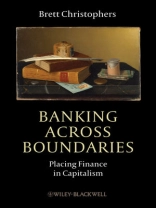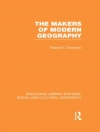This compelling contribution to contemporary debates about the banking industry offers a unique perspective on its geographical and conceptual ‚placement‘. It traces the evolving links between the two, revealing how our notions of banking ‚productiveness‘ have evolved alongside the shifting loci of banking activity.
* An original contribution to the urgent debates taking place on banking sparked by the current economic crisis
* Offers a unique perspective on the geographical and social concept of ‚placement‘ of the banking industry
* Combines theoretical approaches from political economy with contemporary literature on the performativity of economics
* Details the globalization of Western banking, and analyzes how representations of the banking sector’s productiveness have shifted throughout the evolution of Western economic theory
* Analyzes the social conceptualization of the nature – and value – of the banking industry
* Illuminates not only how economic ideas ‚perform‘ and shape the economic world, but how those ideas are themselves always products of particular economic realities
Inhaltsverzeichnis
List of Figures viii
List of Abbreviations ix
Acknowledgments x
Introduction 1
Part I Worlds Apart: Before Keynes 25
1 The Birth of Economic Productiveness 27
2 Instrumental Internationalism 57
Part II Worlds Aligned: From the Great Depression to the Eve of the Big Bang 101
3 Enclosing the Unproductive 103
4 America, and Boundaries Breached 146
Part III Co-Constituted Worlds: The Age of Financialization? 185
5 Layering the Logics of Free Trade in Banking 187
6 Anaemic Geographies of Productive Finance 229
Afterword 275
Index 282
Über den Autor
Brett Christophers is Assistant Professor in the
Department of Social and Economic Geography and the Institute for
Housing and Urban Research at the University of Uppsala, Sweden. He
holds degrees from the Universities of Oxford, UK, British
Columbia, Canada, and Auckland, New Zealand, and is the author
of Positioning the Missionary: John Booth Good and the
Confluence of Cultures in Nineteenth-Century British Columbia
(1998) and Envisioning Media Power: On Capital and Geographies
of Television (2009).












